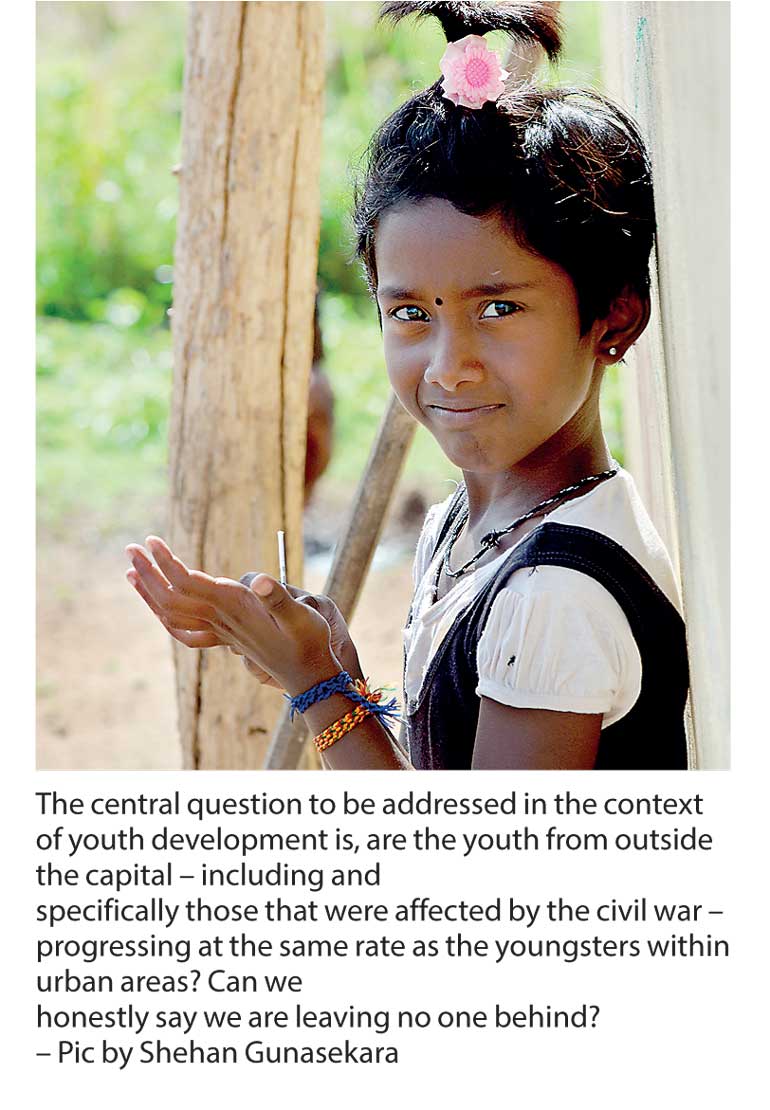Thursday Feb 26, 2026
Thursday Feb 26, 2026
Friday, 8 September 2017 00:00 - - {{hitsCtrl.values.hits}}

 By Nida Admani
By Nida Admani
The underlying theme for the 2030 Agenda is that the 17 Sustainable Development Goals should be achieved without a disparity between different groups; everybody should progress at the same rate to ensure the development of a country and with it, the world at large. True development cannot be achieved if vulnerable sections of the population such as women, children and young people are not included in the policymaking process.
As the UN Secretary General, Antonio Guterres, stated, ‘…the investments we make today in women’s, children’s and adolescents’ health and wellbeing will help build the peaceful, sustainable and inclusive societies we have promised to achieve through the Sustainable Development Goals’.
In the local context, it is reasonable to assume that young people in Colombo and other urban cities have made progress over the last decade. According to an article in the Daily FT, youth unemployment was at ‘a record low of 15.4% in the fourth quarter of 2015’. A reason for this is the increase in opportunities for vocational training and technical education programs, which improve employability of young people, as well as increased access to higher education. The number of university entrants is gradually increasing as well as the number of students going abroad for studies. However, the same article emphasises that ‘such training programs are concentrated in the Western Province, where unemployment rates are already relatively low’.
The central question to be addressed in the context of youth development is, are the youth from outside the capital – including and specifically those that were affected by the civil war – progressing at the same rate as the youngsters within urban areas? Can we honestly say we are leaving no one behind?
I would argue, no. Young people from outside the capital city are not yet a significant part of our policy dialogues, despite the fact that youth affected by the conflict are more vulnerable to the social issues that plague our societies. As the National Human Development Report (NHDR) states, Sri Lanka has the challenge of transforming policies into action and link them to sustainable national goals.
Drug abuse, gang violence and the rate of suicide is higher outside Colombo. In urban areas, the psychological needs of children and young people are being recognised more over the past five years, due to the increase in public awareness of mental health issues and the inclusion of relevant services and treatment in public policies, hospitals and schools. I came across an article recently which stated that ‘young people do reach out to counsellors, befrienders, psychologists and psychiatrists much more than a few years ago’.
Once again, progress in this regard is not present outside of Colombo; ‘most of these services are available only in the metropolitan areas while there is limited access to mental health care in rural areas’. It cannot be denied that the trauma the youngsters from the north and eastern areas of the island have suffered through warrants greater attention and access to psychological services. While big city school children get obsessed with fidget spinners, children in Jaffna reportedly carry drugs that they can acquire from just outside their schools. The need for access of young people in post-conflict areas to counselling and psychological services has not been sufficiently acknowledged by the administration of this country, let alone conceptualised into public policy.
It is undeniable that through the work of Government institutions, youth societies, CSOs and local schools, young people are being empowered to play a greater role in development and political debates with more opportunities for public dialogue, higher education and work experience through training programs and internships. The need for this is greater than ever before, precisely because our country is in a transitional justice period and young people must be more active in the reconciliation process.
However, before we pat ourselves on the back, we must remember that all Sri Lankan youth do not share our sentiments. A significant percentage of the youth population has been left out of public debate for too long when, I reiterate, their social needs and economic difficulties are graver. We will not have achieved the Sustainable Development Goals if in 2030, the rural population of youngsters does not have equal access to employment and higher education opportunities as well as access to mental and psychological health services. Young people who are blessed with these opportunities should take note of this and campaign for the rights of their disadvantaged counterparts.
Here’s to a 2030 that truly leaves no one behind!
(Nida Admani is a law graduate from the University of Leicester and former student of Asian International School. Passionate about human rights and international law, Nida and enjoys writing about important issues and asking the difficult questions. She aspires to work for a prominent human rights organisation one day, and represent Sri Lanka on an international platform. Nida wishes to live on a ship after retiring and swears that a strong cup of coffee can solve any problem.)
(Disclaimer: UNLOCKED is a space for Sri Lankan youth to express their views and opinions on development with the aim of creating positive change in the world. The views expressed in the blogs are solely those of the authors. UNDP Sri Lanka and Daily FT does not represent or endorse the views expressed in these blogs. Read more about the UNLOCKED initiative www.lk.undp.org.)